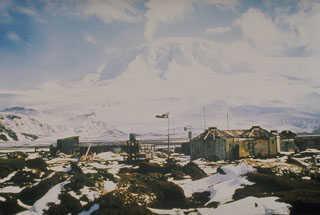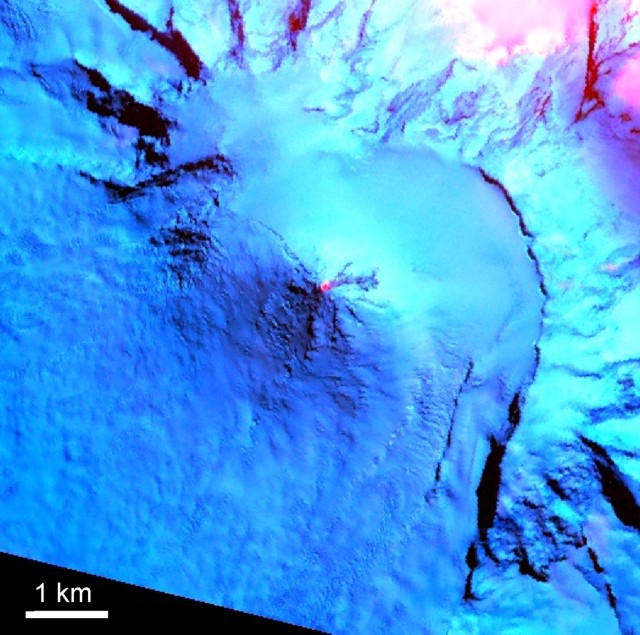Report on Heard (Australia) — November 2006
Bulletin of the Global Volcanism Network, vol. 31, no. 11 (November 2006)
Managing Editor: Richard Wunderman.
Heard (Australia) ASTER images show hotspot for possible lava lake and flow 8 December
Please cite this report as:
Global Volcanism Program, 2006. Report on Heard (Australia) (Wunderman, R., ed.). Bulletin of the Global Volcanism Network, 31:11. Smithsonian Institution. https://doi.org/10.5479/si.GVP.BGVN200611-234010
Heard
Australia
53.106°S, 73.513°E; summit elev. 2745 m
All times are local (unless otherwise noted)
Matt Patrick reported that Heard Island continued to display evidence of activity in its summit crater (continuing the phase which began in May 2006, BGVN 31:05). Figure 10 presents an ASTER image (Bands 9-3-2) from 8 December 2006 showing a hotspot at the summit, presumably a lava lake, with a recently emplaced lava flow extending 700 m E.
Table 2 lists the thermal anomalies recorded by the Hawai'i Institute of Geophysics and Planetology (HIGP) during 25 June 2006 (as last reported in the BGVN 31:05) to mid December 2006. The table lists 27 thermal anomalies during 25 June to 15 December 2006. There is no MODVOLC thermal anomaly on 8 December, the date of the ASTER image in the previous figure.
Table 2. Thermal anomalies from mid-June to mid-December 2006 from MODIS satellites. Courtesy of HIGP Thermal Alerts Team.
| Date | Time (UTC) | Pixels | Satellite |
| 25 Jun 2006 | 1850 | 1 | Terra |
| 17 Jul 2006 | 2000 | 1 | Aqua |
| 06 Aug 2006 | 1935 | 1 | Aqua |
| 13 Aug 2006 | 0425 | 1 | Terra |
| 13 Aug 2006 | 1755 | 1 | Terra |
| 13 Aug 2006 | 1940 | 1 | Aqua |
| 15 Aug 2006 | 1930 | 1 | Aqua |
| 22 Aug 2006 | 1935 | 2 | Aqua |
| 10 Sep 2006 | 1820 | 2 | Terra |
| 12 Sep 2006 | 1805 | 1 | Terra |
| 20 Sep 2006 | 0930 | 1 | Aqua |
| 21 Sep 2006 | 1800 | 1 | Terra |
| 21 Sep 2006 | 1950 | 1 | Aqua |
| 11 Oct 2006 | 1735 | 1 | Terra |
| 11 Oct 2006 | 1925 | 2 | Aqua |
| 24 Oct 2006 | 0920 | 1 | Aqua |
| 27 Oct 2006 | 1735 | 2 | Terra |
| 27 Oct 2006 | 1925 | 1 | Aqua |
| 02 Nov 2006 | 1835 | 1 | Terra |
| 07 Nov 2006 | 1715 | 2 | Terra |
| 07 Nov 2006 | 1905 | 4 | Aqua |
| 17 Nov 2006 | 0830 | 1 | Aqua |
| 24 Nov 2006 | 0430 | 2 | Terra |
| 25 Nov 2006 | 0920 | 1 | Aqua |
| 26 Nov 2006 | 1750 | 2 | Terra |
| 15 Dec 2006 | 1820 | 1 | Terra |
| 15 Dec 2006 | 2005 | 1 | Aqua |
Matt Patrick noted that it is not surprising that the ASTER image showed a thermal anomaly but MODVOLC did not. First, because ASTER has infrared bands at 30-90 m, it is inherently more sensitive to thermal anomalies than the 1-km MODIS bands (MODVOLC uses MODIS data). Second, the MODVOLC algorithm has a threshold which sometimes disregards low-level eruptive activity in order to avoid false alarms. The anomaly in the ASTER image was not particularly large or intense, so it is not surprising it did not show up in MODVOLC.
Geological Summary. Heard Island on the Kerguelen Plateau in the southern Indian Ocean consists primarily of the emergent portion of two volcanic structures. The large glacier-covered composite basaltic-to-trachytic cone of Big Ben comprises most of the island, and the smaller Mt. Dixon lies at the NW tip of the island across a narrow isthmus. Little is known about the structure of Big Ben because of its extensive ice cover. The active Mawson Peak forms the island's high point and lies within a 5-6 km wide caldera breached to the SW side of Big Ben. Small satellitic scoria cones are mostly located on the northern coast. Several subglacial eruptions have been reported at this isolated volcano, but observations are infrequent and additional activity may have occurred.
Information Contacts: Matthew Patrick, Dept. of Geological and Mining Engineering and Sciences, Michigan Technological University, 1400 Townsend Drive, Houghton, MI 49931, USA; Hawai'i Institute of Geophysics and Planetology (HIGP) Thermal Alerts Team, School of Ocean and Earth Science and Technology (SOEST), Univ. of Hawai'i, 2525 Correa Road, Honolulu, HI 96822, USA (URL: http://modis.higp.hawaii.edu/).


